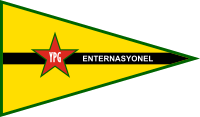YPG International
| YPG International | |
|---|---|
| YPG Tabûra Enternasyonel ( ku) | |
 Flag of YPG International. | |
| Dates of operation | 19 December 2016 — present |
| Active regions | |
| Ideology | Anti-fascism Deir ez-Zor campaign (2017–19) 2019 Turkish offensive into north-eastern Syria |
| Website | https://ypginternational.com/ |
The YPG International or People's Protection Units International (
Syrian Civil War.[3]
Establishment and campaigns
The brigade was founded in December 2016, and elected as its first commander the Italian-Moroccan Karim Marcello Franceschi. The battalion emerged from a proposal for foreign fighters to serve in an English-speaking unit, as opposed to the International Freedom Battalion, where the predominant language is Turkish.[4]
The unit is composed mostly of people from
Islamic State of Iraq and the Levant. The statement was released in several languages, including English, Italian, Spanish and Basque
.
The unit took part in the 2016
2019 Turkish offensive into northeastern Syria
.
See also
- International Freedom Battalion
- International Brigades
- Foreign fighters in the Syrian and Iraqi Civil Wars
- Rojava conflict
References
- ^ "Rojava: New international battalion formed – Antifascist Internationalist Tabur!". Insurrection News. 21 December 2016. Archived from the original on 23 June 2019. Retrieved 31 January 2018.
- ^ Andrew W., Griffin (21 December 2016). "AIT: Anti-fascist battalion comprised of internationalists forms in Rojava". Red Dirt Report. Retrieved 29 January 2018.
- Rolling Stone Magazine. Archived from the originalon 28 August 2017. Retrieved 29 January 2018.
- ^ "La historia de tres amigos: Antifascistas internacionalistas de Rojava" (in Spanish). Rojava Azadi Madrid. 21 July 2017. Retrieved 29 January 2018.
Heval Marcelo se unió a la Resistencia de Kobanê, y escribió un libro sobre ello más tarde. Heval Çiya, por otro lado, llegó a Kobanê para trabajar en un proyecto hospitalario. Marcelo mantuvo el contacto con el Batallón Internacional por la Libertad después de regresar a Europa durante un tiempo. Entonces, cuando una vez más regresó a Rojava, él y Çiya se conocieron en un grupo de entrenamiento y decidieron formar un batallón antifascista. La dominación de algunas organizaciones turcas -las 3 predominantes, para ser más precisos- les hicieron sentir muy incómodos. Dijeron que los anarquista no eran muy bienvenidos y que uno necesitaría tener un conocimiento de la teoría marxistas, y seguirla para ser aceptado y apreciado. "No tienen conexiones con Europa, y no hacen ningún esfuerzo por construir ninguna. Lo más importante, todas las reuniones se celebraban en turco, que es el idioma predominante. Estos fueron algunos de los molestos asuntos que nos hicieron pensar."
Further reading
- Gifford, Macer. Fighting Evil: The Ordinary Man who went to War Against ISIS. Seven Dials (2020).
- Stoddard, Warren II. A Good Place on the Banks of the Euphrates: Stories from the War Against ISIS. Pine Needle Floor (2021).
